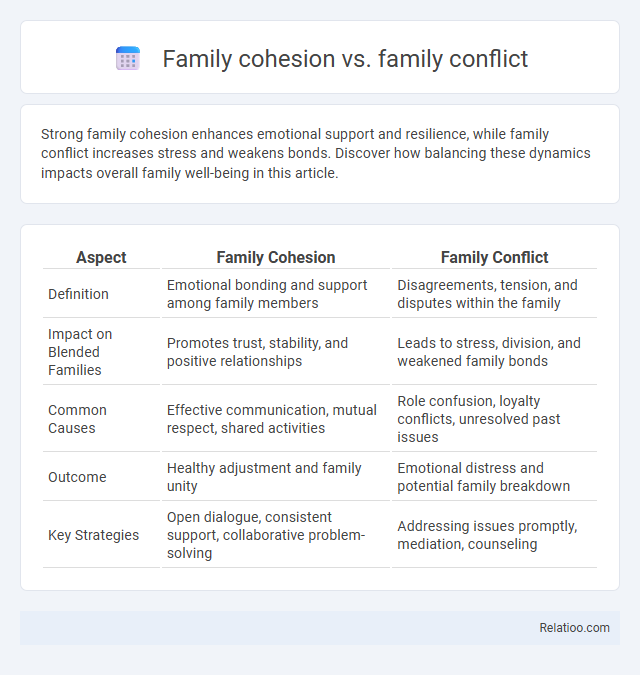Strong family cohesion enhances emotional support and resilience, while family conflict increases stress and weakens bonds. Discover how balancing these dynamics impacts overall family well-being in this article.
Table of Comparison
| Aspect | Family Cohesion | Family Conflict |
|---|---|---|
| Definition | Emotional bonding and support among family members | Disagreements, tension, and disputes within the family |
| Impact on Blended Families | Promotes trust, stability, and positive relationships | Leads to stress, division, and weakened family bonds |
| Common Causes | Effective communication, mutual respect, shared activities | Role confusion, loyalty conflicts, unresolved past issues |
| Outcome | Healthy adjustment and family unity | Emotional distress and potential family breakdown |
| Key Strategies | Open dialogue, consistent support, collaborative problem-solving | Addressing issues promptly, mediation, counseling |
Introduction to Family Cohesion and Conflict
Family cohesion refers to the emotional bonding and connectedness among family members, fostering support and unity within the household. Family conflict involves disagreements or tensions that challenge relationships, often resulting from differences in values, communication styles, or external stressors. Understanding family cohesion and conflict is essential for promoting healthy interactions and resilience in family dynamics.
Defining Family Cohesion
Family cohesion refers to the emotional bonding and sense of togetherness among family members, promoting support, trust, and effective communication. Family conflict involves disagreements and tension that can disrupt relationships and reduce overall harmony within the family unit. Understanding your family's level of cohesion helps identify strengths and areas needing improvement to foster a healthier, more supportive environment.
Understanding Family Conflict
Family conflict arises from misunderstandings, differing values, and communication breakdowns that disrupt family cohesion, which represents emotional bonding and mutual support among members. Understanding family conflict involves recognizing patterns of interaction, sources of tension, and the impact on relationships to promote resolution and restore cohesion. Effective conflict management enhances family resilience, leading to healthier relational dynamics and stronger emotional connections.
Key Factors Influencing Family Dynamics
Key factors influencing family dynamics include communication patterns, emotional support, and conflict resolution strategies which shape family cohesion and family conflict. Your family's ability to foster open dialogue and mutual understanding enhances family cohesion, reducing misunderstandings and tension. Conversely, poor communication and unresolved disputes increase family conflict, disrupting harmony and negatively impacting overall family functioning.
Benefits of Strong Family Cohesion
Strong family cohesion fosters emotional support, trust, and effective communication among members, which enhances mental health and resilience during stressful times. Families with high cohesion experience lower levels of conflict and better problem-solving ability, contributing to overall well-being and stable relationships. This unity promotes positive development in children, reducing behavioral issues and encouraging academic success.
Common Causes of Family Conflict
Common causes of family conflict often stem from poor communication, financial stress, and differing values or expectations among family members. Family cohesion tends to weaken when unresolved conflicts lead to emotional distance, lack of trust, and reduced support within the household. Strengthening family cohesion requires addressing sources of conflict early and promoting open dialogue, empathy, and mutual respect.
Impact of Cohesion on Mental and Emotional Health
Family cohesion strengthens emotional support networks that enhance mental well-being, reducing anxiety and depression rates among members. Conflict within families increases stress levels and risks of psychological distress, undermining emotional health and stability. You benefit from fostering family cohesion, which promotes resilience and healthier coping mechanisms during challenging times.
Consequences of Unresolved Family Conflict
Unresolved family conflict often leads to diminished family cohesion, causing emotional distress, communication breakdown, and increased risk of mental health issues among members. Persistent conflicts disrupt the family's ability to provide stable support, resulting in weakened relationships and lowered overall well-being. In contrast, strong family cohesion fosters resilience and effective problem-solving, reducing the negative consequences associated with unresolved disputes.
Strategies to Enhance Family Cohesion
Strategies to enhance family cohesion involve fostering open communication, encouraging shared activities, and promoting emotional support among members. You can implement regular family meetings, create traditions, and develop conflict resolution skills to reduce family conflict and build a stronger, more connected unit. Prioritizing empathy and active listening helps maintain harmony and reinforces positive relationships within the family.
Solutions for Managing and Reducing Family Conflict
Effective communication and active listening play a crucial role in managing and reducing family conflict, fostering stronger family cohesion by addressing misunderstandings before they escalate. Establishing clear boundaries and mutual respect within the family helps create a supportive environment where conflicts are resolved constructively. You can enhance family cohesion by encouraging collaborative problem-solving and seeking professional counseling when conflicts persist or intensify.

Infographic: Family cohesion vs Family conflict
 relatioo.com
relatioo.com